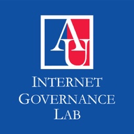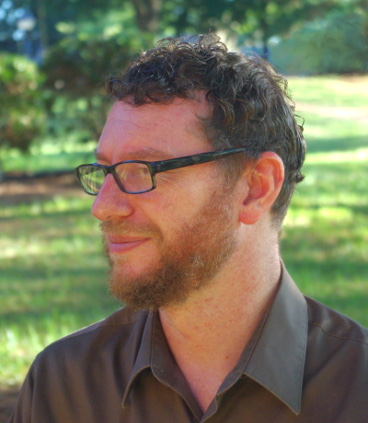Internet Governance Lab Faculty Fellow Professor Jennifer Daskal, Associate Professor of Law at American University Washington College of Law, will present our next Roundtable event on her forthcoming article "Borders and Bits" on Wednesday, January 24 from 2:30pm-4:00pm in SIS Room 349.
SOC Alumnus Dr. Luis Hestres Discusses Net Neutrality on Texas Public Radio
Discussing the implications of the proposed repeal on Texas Public Radio’s “The Source” on Monday, SOC alumnus and professor in digital communication at the University of Texas at San Antonio Dr. Luis Hestres described net neutrality as “the principle that internet service providers can’t discriminate against any type of data that flows through their networks.”
Faculty Director Dr. Derrick Cogburn Speaks at OU Cyber Governance and Policy Center
Internet Governance Lab Co-Director Dr. Derrick Cogburn, who holds a joint appointment as Associate Professor in the School of International Service and Kogod School of Business, returned to his home state to speak on multistakeholder global governance and policy issues at the University of Oklahoma and University of Central Oklahoma on November 13-14, 2017.
Postdoctoral Fellow Dr. Andrew Rens on “Emerging Issues in the Internet of Things” at The Centre for Internet & Society
AU Internet Governance Lab Postdoctoral Fellow Dr. Andrew Rens gave a talk on “Emerging Issues in the Internet of Things” at the Centre for Internet & Society in Bengaluru, India on October 23, 2017. The talk was based on his research about the complex problems that are emerging around the proliferation of the Internet of Things (IoT), including ownership and control, privacy and surveillance, and ubiquity and network fragility.
#DataLove: A new norm for data security?
Harlo Holmes, Director of Newsroom Digital Security at the Freedom of the Press Foundation, led a Digital Security Clinic on Friday, October 13 at American University’s School of Communication. The session was co-sponsored by AU’s Internet Governance Lab, the Center for Media & Social Impact and the Internet Society of Washington, DC.
Faculty Fellow Dr. Kathryn Montgomery to speak at HHS on Health Wearables and Privacy in the Digital Age
On Thursday, October 26, 2017, Internet Governance Lab Faculty Fellow and Director of AU’s Communication Studies Division Dr. Kathryn Montgomery will discuss the wide-ranging implications of Internet-connected health wearables at a conference organized by the Department of Health and Human Services. The presentation, titled “Health Wearables: Ensuring Privacy, Security, and Equity in an Emerging Internet-of-Things Environment,” draws on Dr. Montgomery’s research at the intersection of the Internet of Things and privacy, including an AU and Center for Digital Democracy study (funded by the Robert Wood Johnson Foundation), looking at the privacy and consumer protection concerns raised by the proliferation of health and fitness wearables, which consumers are increasingly using to track everything from their heart rates to sleep patterns and stress levels.
Internet Governance Lab hosts Data Hygiene Clinic
On Friday, October 13th from 3-4:30pm, the Internet Governance Lab, in collaboration with the Freedom of the Press Foundation, the Center for Media and Social Impact, and the Washington, D.C. chapter of the Internet Society, will host a discussion providing practical steps students, faculty, and all members of the AU community can take to protect themselves from a variety of digital threats.
Orwell’s 1984 and the Contemporary Cyber Surveillance State
On Wednesday, October 18th, from 3-4:30 pm in Batelle-Tompkins Atrium, the American University Literature Department and the Internet Governance Lab hosted a colloquium on Orwell’s 1984 and its relevance to the contemporary cyber context.
All sectors of the economy and society are now digitally mediated, made possible by the Faustian bargain of pervasive and privatized surveillance in which citizens relinquish personal data in exchange for free services. Authoritarian and democratic nation-states alike enact expansive surveillance, either for politically motivated censorship, identification of dissidents, or law enforcement and intelligence gathering. The same technologies that have provided unprecedented opportunities for creative expression, innovation, and free speech are used for all manner of social, political, and economic control. Modern flashpoints such as the Snowden NSA surveillance disclosures and Russia’s cybersecurity incursions and influence campaigns during the 2016 American presidential election have attracted greater public attention to longstanding tensions between cybersecurity and human rights.
This panel brings together experts in cyberpolitics and cybersecurity to examine Orwell’s 1984 through the lens of the contemporary cyber-surveillance state. How has the language of Orwell shaped/constructed modern cyber discourses? How do the modern surveillance state and underlying political tensions differ from Orwell’s dystopian vision? How would 1984 have been re-written in light of contemporary technological capabilities? Speakers include:
Moderator: Dr. Linda Voris
Professor in the Department of Literature
American University
Dr. Derrick Cogburn
Faculty Director, Internet Governance Lab at American University
Professor in the School of International Service
Dr. Laura DeNardis
Author of The Global War for Internet Governance (Yale University Press)
SOC Professor and Faculty Director, Internet Governance Lab at American University
Dr. Eric Novotny
Professor in the School of International Service
Faculty Fellow, Internet Governance Lab at American University
Colonel (Ret) Randolph Rosin
Faculty of the National Intelligence University
Internet Governance Lab Research Fellow
Dr. Andrew Rens Joins Internet Governance Lab as Postdoctoral Fellow
By Kenneth Merrill
The Internet Governance Lab is pleased to announce that Dr. Andrew Rens will be joining us as a Postdoctoral Research Fellow. In this capacity, he will be running a research program focused on technology governance of the Internet of Things. As Dr. Rens explains:
The Internet of Things raises complex issues of ownership and control, privacy, and surveillance, ubiquity, and fragility. Some press accounts narrate these issues as consumers versus corporations in which consent is key. But the Internet of Things is mostly the Internet of Other People’s Things, we interact with these Internet-connected objects as employees, students, tenants, and citizens. The things are not simply data input devices, however intrusive but technologies with immediate physical effects such as networked 3D printers. Questions around the governance of the Internet of Things (IoT) exhibit the same super complexity as Internet governance generally; with multiple sites of governance and actors operating across legal borders.
The IoT is promising for the developing world and digital inclusion. Through cheap sensors and the ability to fabricate equipment, the IoT may dramatically lower barriers to scientific experimentation. Every classroom could potentially be a laboratory. But will the Internet of Things be configured to optimize these possibilities? How will development and human rights be taken into account when governance is neither state nor corporate but takes place through technical standards, protocols and engineering organizations.
Who will control the “things” in the IoT and what will determine this control? Will it be intellectual property law or standards? Open source offers one way in which the people most affected by a technology can exercise some control over it. Open source software and its associated governance structures have proven resistant to control through intellectual property laws. Will a combination of open source software and open hardware prove similarly robust? Even if open source methods best enables innovation will it control the potentially pernicious uses such as printing guns with a 3D printer?
Rens earned a Doctor of Juridical Science (SJD) from Duke University Law School for research on using open copyright licenses in education. As a Shuttleworth Foundation Fellowship, he pioneered work on access to knowledge, IP law reform and open education in South Africa. Andrew Rens has been a fellow at the Stanford Center for Internet and Society, a research associate at the LINK Center at the University of the Witwatersrand, Johannesburg, and the University of Cape Town Intellectual Property Law Research Unit. As founding Legal Lead of Creative Commons South Africa, he ported the South African licensing suite to South African law. He earned a Master of Laws from the University of the Witwatersrand for research on Internet legal issues. He has taught Master’s courses in Intellectual Property, Telecommunications, Broadcasting, Space and Satellite, and Media and Information Technology Law at the Law School of the University of the Witwatersrand. He has also taught Telecommunications Law and Electronic Intellectual Property Law at the University of Cape Town Law School.
Please join us in welcoming Dr. Rens to the Internet Governance Lab and AU and we look forward to hearing from him soon on the always evolving intersection of the IoT and Internet governance.
Ukrainian Cyber Expert Andrii Paziuk to speak at Internet Governance Lab Roundtable
Andrii Paziuk is a Hubert Humphrey Fellow at American University's Washington College of Law.
By Kenneth Merrill
On Wednesday, September 20, 2017, Ukranian cyber expert Andrii Paziuk will discuss “Digital Policy, Civil Rights, and Security” as part of the Internet Governance Lab’s Roundtable Speaker Series. The event will take place at 2:30 pm in McKinley Room 305.
As a 2017-18 Humphrey Fellow at AU’s Washington College of Law, Mr. Paziuk’s work draws on his experience in government, industry, and academia to explore questions focused on the intersection of cybersecurity, privacy, and transborder data flows.
Prior to joining AU Mr. Paziuk worked for the Parliament of Ukraine as a legal adviser and an assistant to Members of Parliament. Since 2012, Mr. Paziuk has been a lecturer and LL.M. program moderator of International Cyber Law at Taras Shevchenko National University of Kyiv. He completed his Ph.D. thesis on the protection of privacy and personal data trans-border flows in 2004 and his post-doctoral thesis on International Cyber Law in 2016. Paziuk is also an adviser to the State Special Telecommunications and Information Protection Service, a member of the Steering Committee of Ukrainian National Internet Governance Forum, and co-founder and chairman of the NGO Partners for Digital Rights Defenders and Vice-President to the Ukrainian Academy of Cyber Security. His current research is focused on ‘The Rule of Law and Internet Governance’ exploring recent trends in digital policy and law, civil rights, and security issues.




